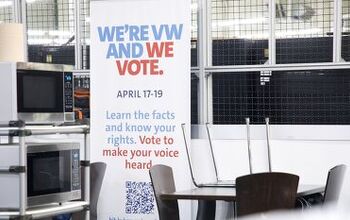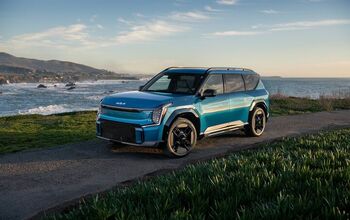Volkswagen Demands More Of Its Second Chinese Wife

Much to my own surprise I read in China Daily that Volkswagen only holds 40 percent in its partnership with its Chinese joint venture partner FAW. I always thought they had the usual 50:50. Well, it looks like my beliefs will become reality.
“FAW plans to transfer an additional 9 percent stake to Volkswagen’s luxury unit Audi,” writes the government-owned newspaper. The usual insiders with knowledge of the deal “note it has already been approved by the joint venture’s board of directors and has been submitted to government departments for approval.”
The new share structure would be 51:49, giving FAW that extra share so that First Auto Works can reflect the complete revenue of the joint venture on its books.
Moving the shares to Audi doesn’t make a difference as far as Volkswagen is concerned. On Wolfsburg’s books it’s one and the same. In China, it probably looks better if the country’s largest and most revered luxury brand has a bigger slice.
Volkswagen has aggressive plans for China. The company is busy expanding capacities at its both joint ventures. It is understandable that VW wants to put its holdings on more solid footings. Last year, China became Volkswagen’s largest market worldwide on a consolidated basis, and it is bound to grow rapidly. It is understandable that Wolfsburg wants to have a bigger share of the earnings. That, however, is a simplistic view. The byzantine and tax optimized financials of a German-Sino joint venture are impossible to understand for an outsider, and only few insiders know all the secrets.
China Daily is only scratching the surface when it says:
“While most Sino-foreign automobile joint ventures have a 50-50 structure and are theoretically equal partners, foreign automakers usually have a majority ownership or even 100 percent share of the parts companies that provide components needed to make the cars.”
A foreign joint venture partner makes money through licensing fees for brands, cars, platforms, technology. There are parts sales, charges for training programs, sales literature and a myriad of other things. Compared to money you can take off the top, dividends from shares are cumbersome, slow and usually tax-inefficient. What’s more, the profit distribution does not necessarily have to follow the number of shares. The shareholder agreement can specify a different payout. If you want more of the profits, write another contract.
Control also is not the issue. In practical terms, one doesn’t gain more control of such a joint venture by having more shares to vote. Decisions are made by consensus. Both sides have to say yes. If one side says no, it’s a no. Every decision is a deal.
Volkswagen has another trump card in its relationships with China. Like most successful businessmen in China, Volkswagen has a second wife. SAIC was its first. FAW came second. The two are bitter rivals. Long seen as an impediment, this enhances Volkswagen’s bargaining power in the daily dealings. If one JV partner says no, there is always another one. VW has successfully used the power of polygamous persuasion brought by models, platforms, technologies and intra-Chinese rivalries.
Zeng Zhiling, director of JD Power Asia Pacific said: “From both cases (FAW-VW and Shanghai GM), we can see one thing in common – Chinese automakers are still in the weaker position at their joint ventures.”
So why does Volkswagen increase its shares of the FAW-VW joint venture? Probably because they have the money and they think it will bring better returns than sitting in the bank. Why does FAW sell? It puts money on the table, and possibly gains FAW more attention from Wolfsburg.

Bertel Schmitt comes back to journalism after taking a 35 year break in advertising and marketing. He ran and owned advertising agencies in Duesseldorf, Germany, and New York City. Volkswagen A.G. was Bertel's most important corporate account. Schmitt's advertising and marketing career touched many corners of the industry with a special focus on automotive products and services. Since 2004, he lives in Japan and China with his wife <a href="http://www.tomokoandbertel.com"> Tomoko </a>. Bertel Schmitt is a founding board member of the <a href="http://www.offshoresuperseries.com"> Offshore Super Series </a>, an American offshore powerboat racing organization. He is co-owner of the racing team Typhoon.
More by Bertel Schmitt
Latest Car Reviews
Read moreLatest Product Reviews
Read moreRecent Comments
- Brendan Duddy soon we'll see lawyers advertising big payout$ after getting injured by a 'rogue' vehicle
- Zerofoo @VoGhost - The earth is in a 12,000 year long warming cycle. Before that most of North America was covered by a glacier 2 miles thick in some places. Where did that glacier go? Industrial CO2 emissions didn't cause the melt. Climate change frauds have done a masterful job correlating .04% of our atmosphere with a 12,000 year warming trend and then blaming human industrial activity for something that long predates those human activities. Human caused climate change is a lie.
- Probert They already have hybrids, but these won't ever be them as they are built on the modular E-GMP skateboard.
- Justin You guys still looking for that sportbak? I just saw one on the Facebook marketplace in Arizona
- 28-Cars-Later I cannot remember what happens now, but there are whiteblocks in this period which develop a "tick" like sound which indicates they are toast (maybe head gasket?). Ten or so years ago I looked at an '03 or '04 S60 (I forget why) and I brought my Volvo indy along to tell me if it was worth my time - it ticked and that's when I learned this. This XC90 is probably worth about $300 as it sits, not kidding, and it will cost you conservatively $2500 for an engine swap (all the ones I see on car-part.com have north of 130K miles starting at $1,100 and that's not including freight to a shop, shop labor, other internals to do such as timing belt while engine out etc).


































Comments
Join the conversation
Surely that should add up to 100% instead of 101. ;)